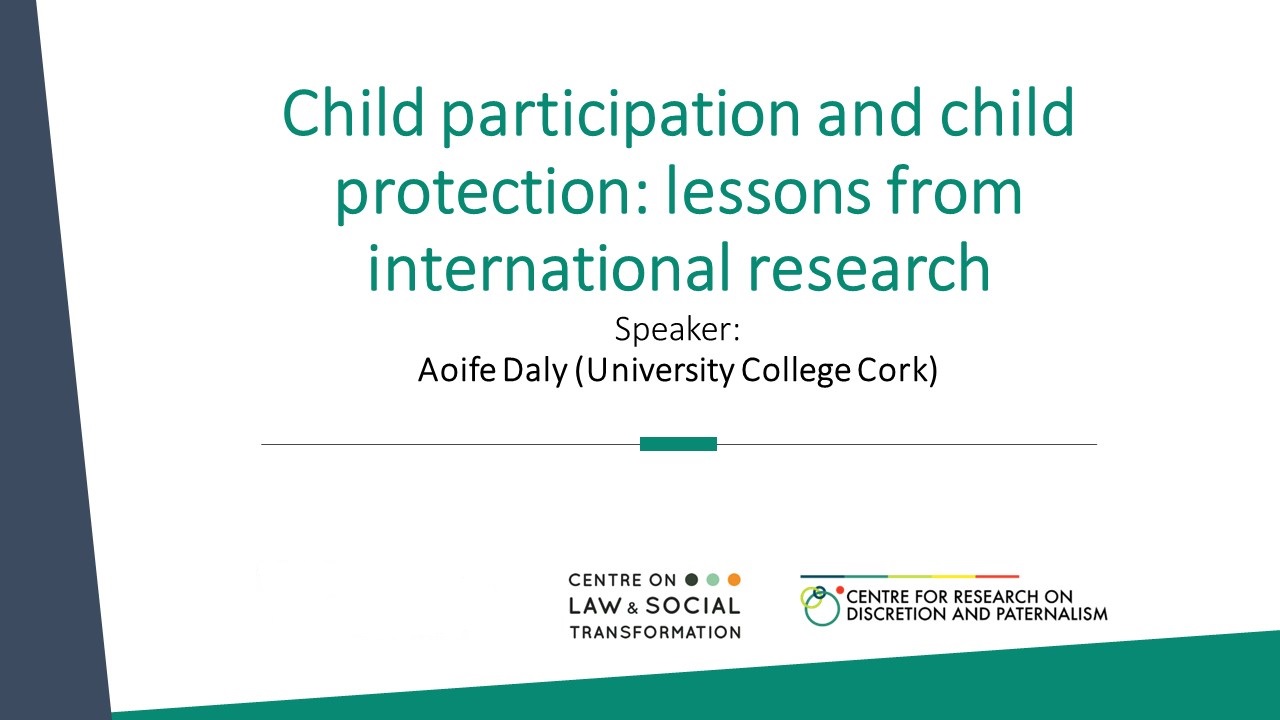
- This event has passed.
RDV: Child participation and child protection: lessons from international research (Aoife Daly)

We welcome you to our RDV seminar with Professor Aoife Daly. She will give a talk on a paper which is based on her book “Children, Autonomy and the Courts: Beyond the Right to be Heard“. This paper is concerned with the influence of children on decisions affecting them. It appears that the right to be heard under Article 12 of the UN convention on the rights of the child has brought some positive change in terms of children simply feeling heard. It is not all about outcomes – the perception of being listened to, of being taken seriously, is undoubtedly good for children: I think the judge kind of listened to me in the end. There is evidence that the right to be heard has encouraged an attitude shift when it comes to hearing children and valuing their views – there is a sense that children should be heard, at least in some circumstances. Yet there is little point hearing children if their wishes are unlikely to make any difference to outcomes. Indeed Article 12 of the CRC says that children’s views must be given due weight, which implies some level of influence. What does international research demonstrate in terms of the influence of children’s wishes and child protection proceedings in courts? This paper presents research in this area, and findings point to inconsistent, confusing and illogical approaches by the courts to children’s wishes. The reasons for this are considered in this paper. It is emphasised that courts refuse to accept that there is a limited ability to ensure a ‘good’ outcome. This is to the detriment of a good process, one which prioritises children’s wishes. Courts also think that they are acting as benevolent parents when they impose best interest determinations, which is mistaken as courts are representatives of the state (and therefore have the threat of force behind them). It is also mistaken because families do not always operate in a ‘parents say, children do’ It is argued that there is a risk that the Article 12 right to be heard, and its lack of influence for children in reality, in fact works to uphold traditional power dynamics. The state wins because children’s wishes can be overridden when they incline against state authorities, or prevailing beliefs such as ‘contact at all costs.’ It seems that children’s wishes within the ‘right to be heard’ framework are least effective where they are needed the most – where those wishes incline against adults, and particularly where they incline against the status quo. The question of whether a focus on autonomy would shift this influence gap will be posed.
Aoife Daly teaches law, and specialises in human rights law. Aoife’s research focuses on human rights based approaches and children’s rights in areas which include environmental rights, climate activism, and access to justice. She is at present researching children/youth and how their environmental activism is impacting human rights law. In 2023 she secured a European Research Council Consolidator Grant to build a team to carry out a large scale research study on child/youth climate justice-inside and outside the courts-around the world. UCC Research Profiles: Aoife Daly, Law
How to participate: At Christies gate 17, Styrerommet (rom 17.103 ) or digitally via Zoom.
To receive a zoom invitation to the RDV-webinar, please contact discretion@uib.no.
If the Zoom application is new to you, we recommend that you press the link well before the events to download the program. You may leave and rejoin the meeting at any time.
